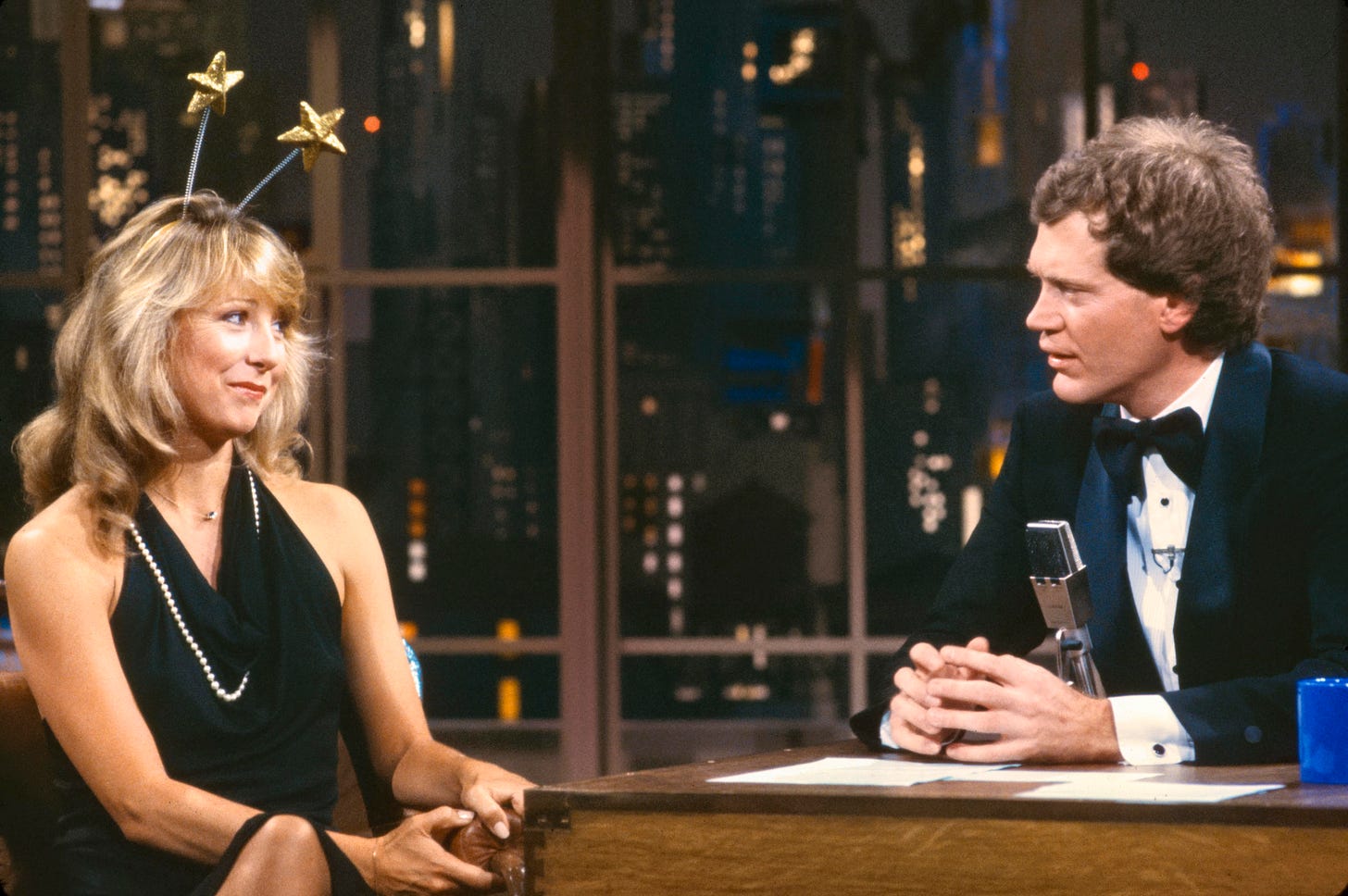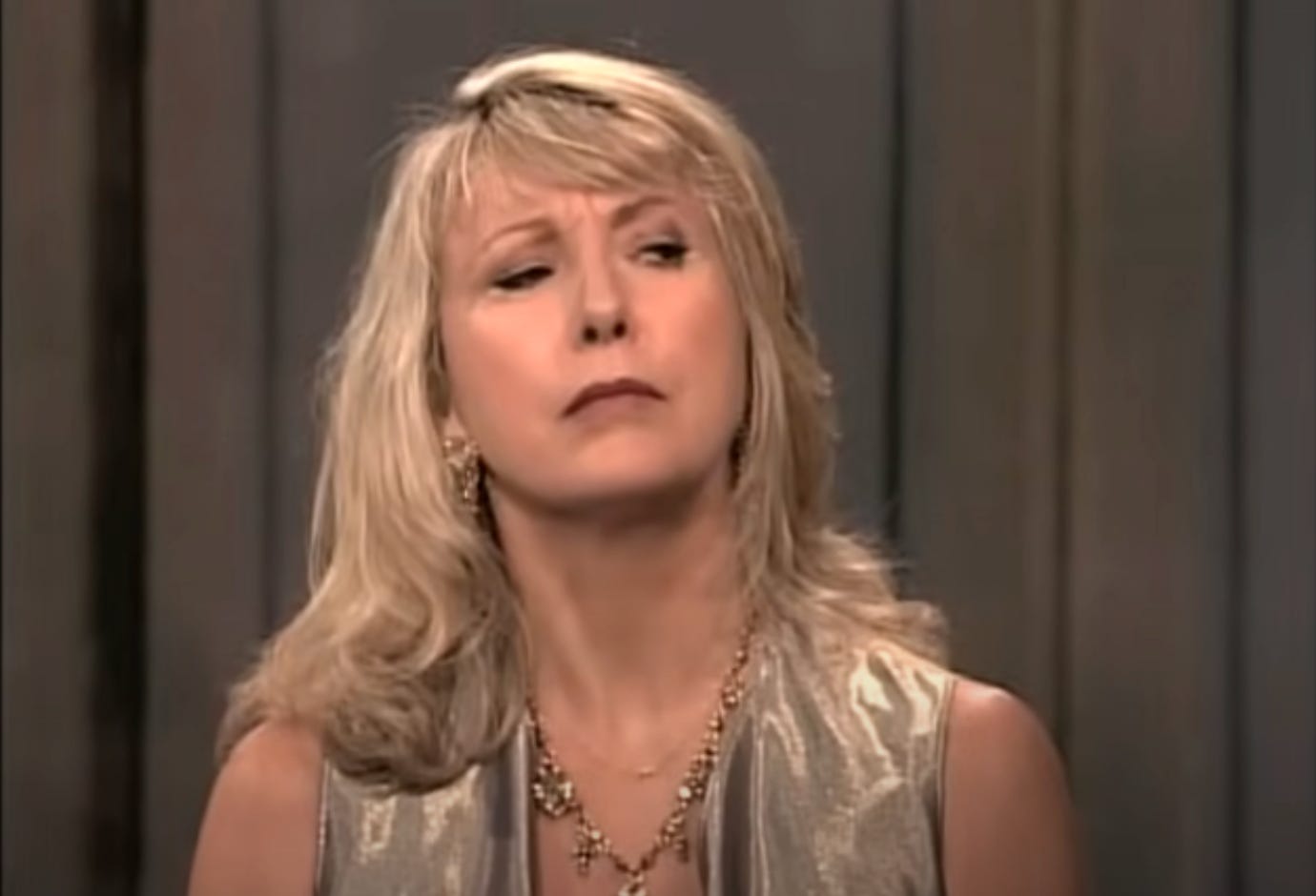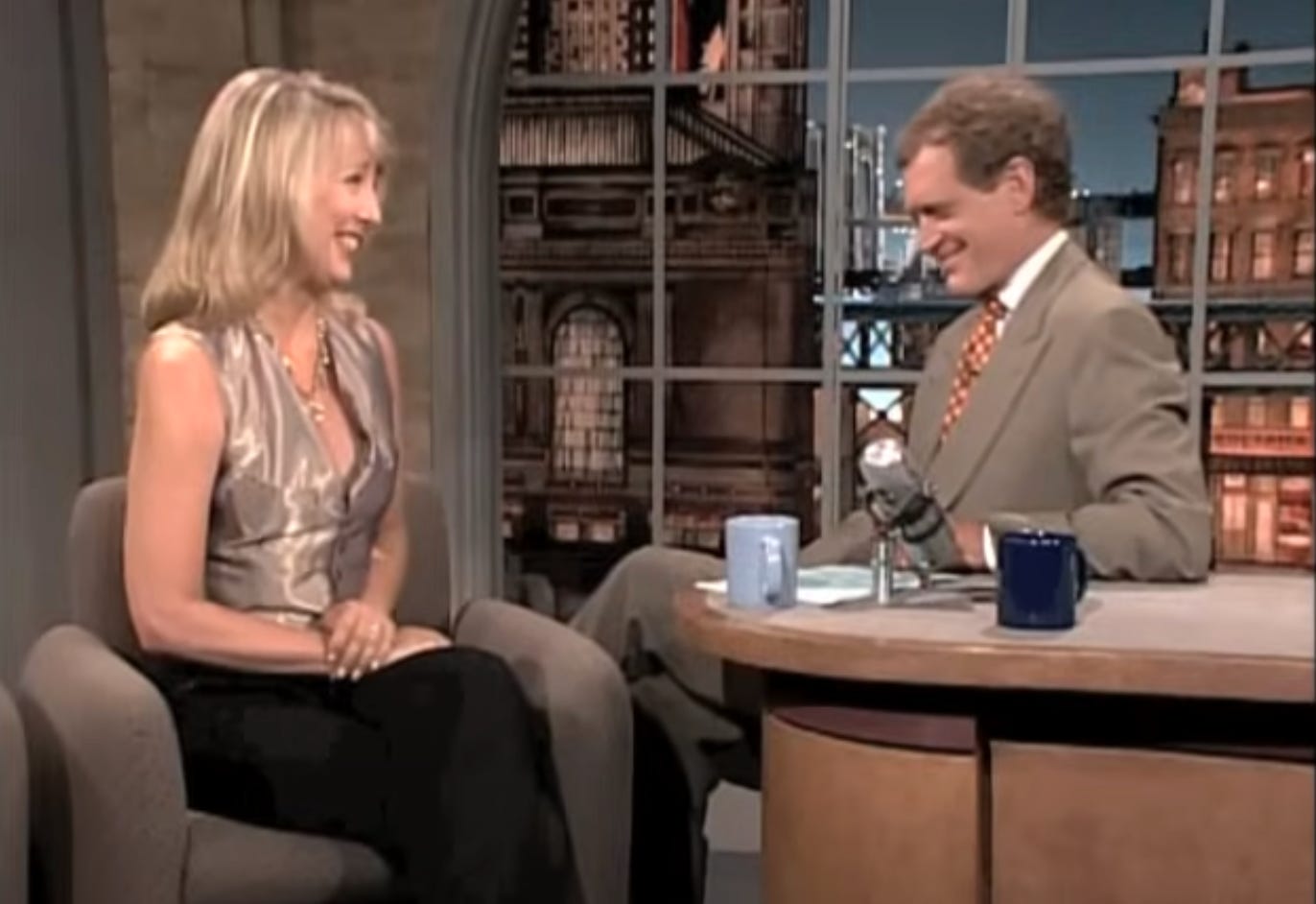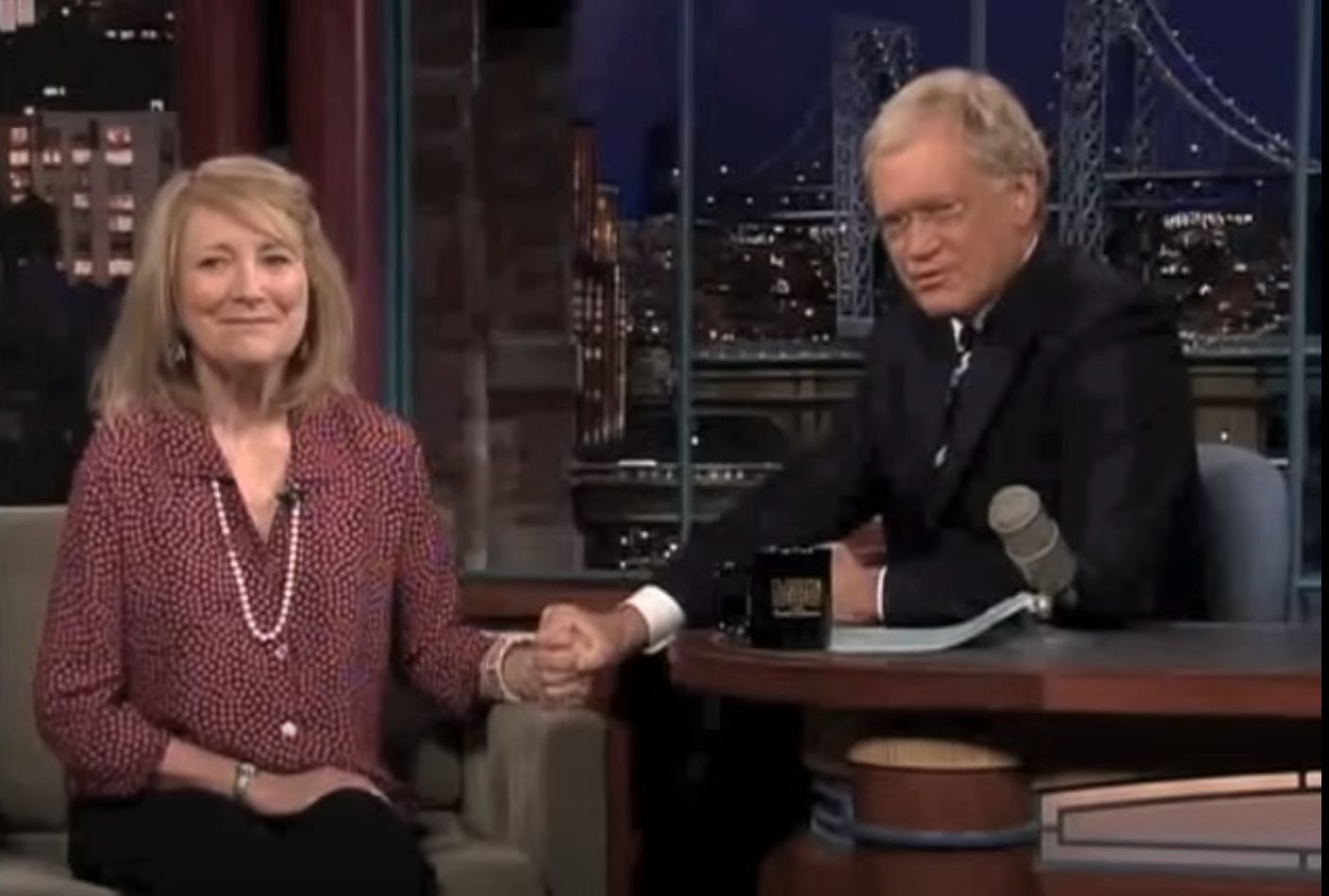“I tease you, and yet I love you,” says Teri Garr to David Letterman on one of her many appearances on his show, circa early 1990s. The dangerous chemistry between Garr and Letterman made for such riveting television that when I started watching clips from their shows on YouTube after Garr’s death on October 29th, there wasn’t one dull/dud moment in over nine hours of footage.
They are similar in that both Garr and Letterman throw out insults at random; they are both always testing each other, and on the defensive. But they are different in that Garr likes to be purely spontaneous while Letterman likes to rely on his guest notes. When she gets him to abandon the notes, they’re even funnier together, and what’s even funnier than that is that Letterman clearly thinks not working from the notes leads to bad television, and he’s very wrong on that, at least with Garr. In one of Garr’s last appearances on his show, Letterman says that he was always excited when she was going to come on and felt as if they were perpetually going on a first date.
Garr appeared so frequently on Letterman’s show in the 1980s and early 1990s that sometimes she is promoting a single movie multiple times, and she is refreshingly candid about her thoughts about these movies, which tend to the negative; she oozes sexuality in the way she sits or tosses her hair, yet her face habitually settles into very distinctive grimaces and winces.
When she mentions doing a Samuel Beckett play in LA, or being a member of the Strindberg Society, Letterman has no idea what she’s talking about and only perks up when sports is mentioned, or some engineering question. They sometimes do a Lady and the Tramp thing where she will throw out a mock-haughty “How dare you?” to one of his zingers, but then sometimes she will be the rebellious teenager to his stern father figure; she is very flexible, and he isn’t. Garr is the irresistible force and Letterman is the immovable object. He likes to pounce on a weakness and not let go of it, while she lands her own barbs with the most unexpected reactions. They both have what authority figures would call a “bad attitude,” but the different ways they expressed that led to creative friction.
Letterman is a very specific type of midwestern man, decent but grumpy and always teasing in a way that might verge on actual malice. Garr is a hot LA chick, but she’s the quirky hot chick, the brainy hot chick, flighty and zany, and she is down on herself in a very 1970s-style neurotic way, but she loves wordplay and has a very quick wit, which balances Letterman’s heavier style. It becomes increasingly clear how fond he is of her on the 1980s shows, and he always wants her to stay for the whole show and not just her segment, whereas Garr is always wary of him. Letterman has the power in his domain, but Garr in the 1980s has the power to get permanently “steamed,” as he puts it, and never come back.
There is very little outright flirting between them. It’s more like they are a husband and wife who are performing a show with edgy banter for company. He tests her in a very old-fashioned “I’m dipping your pigtails in the inkwell because I like you” way, and she always looks at him very skeptically. There comes a point in the early 1990s when she is in her usual snit about him teasing her and Garr says his behavior has to do with “something about your mother.” Letterman is always asking Garr herself about her own mother, who worked as a Rockette, and this is a moment where it feels like Garr goes too far with him, just as there are similar moments where he goes too far with her in earlier episodes, like the notorious segment where Letterman keeps asking her to take a shower in his office, for which he apologized the next time she went on.
Garr began appearing on Letterman’s show at what in retrospect was the height of her career, right when she was nominated for an Oscar for Tootsie (1982), and Letterman’s own YouTube channel put the interview up about this Oscar nomination as a tribute to her after her death. Garr had come up the hard way as a dancer in Elvis movies before playing in Mel Brooks’s Young Frankenstein (1974), a perfect comedy in which she memorably asked, “Would you like a roll in the hay?” in a German accent.
By the early 1980s, Garr fit into Letterman’s post-modern talk show world because she made it clear how bad she was at telling jokes and doing prepared comic material; she would tell bad jokes badly while Letterman would smile ironically. When Letterman moved to CBS in 1993, Garr was seen as a holdover from an earlier era. She didn’t come on as much, and when she did appear, Garr was expected to have her jokes and anecdotes at the ready like every other guest. Letterman was an institution by this point, and Garr was in her fifties and wasn’t plugging hit feature films anymore but failed sitcoms.
On the earlier shows, Garr sometimes mentions doctor visits or illnesses, very briefly, and this is ominous now because she was experiencing the first symptoms of multiple sclerosis in the early 1980s, but she wasn’t diagnosed until much later. In the last few times she was on his CBS show in the mid-1990s, Garr no longer wears skirts and heels but pants and gym shoes, and walking out to Letterman’s desk starts to become a bit difficult for her.
There were two last appearances for Garr on Letterman’s second show in the 2000s, one to promote her memoir, and one to promote her last feature in 2008. Garr has some jokes she delivers in the midst of speaking about her illness, and she delivers them with brave professionalism, but the heyday of the Garr-Letterman TV courtship was all about how she was bad at telling jokes and wanted to be totally spontaneous with her host, and this added to the sadness of so much that had been lost.
In these last appearances, Letterman tells Garr that she saved his show time and again in the early days because she was always ready to appear if he needed her. She was the ultimate Letterman guest, and he knew it. Letterman went on being the king of his own talk show kingdom, and Garr gradually had everything taken away from her in terms of health and career. But people will always think of them together, and what they did together on this late-night talk show is still one of the most delightful and unpredictable of all comedy double acts, at its best when Garr made Letterman work without a net.








Well done. Dan.
My wife and I were raising a family during the heydays of their interviews and missed most of them (until they were later posted, of course). But on occasion, I'd be up late and caught one or two. Yes, it was a talk show, but it was oddly intimate and relaxing. Godspeed, Ms. Garr!
Beautifully written tribute Dan.